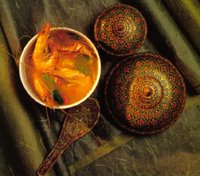
Thai food, like Thai culture, is the product of various influences, blended to form one distinctive cuisine. Ordinary fare in Sukhothai and early
Ayutthaya was simple: mainly fish, fresh or dried, mixed with rice, vegetables, a few spices, and a salty sauce made from fermented fish or shrimp. Other ingredients and flavors came through increased contact with foreign cultures,
China and
India in particular, and also Europe. Today it covers a wide range of dishes, many of them regional specialties; those of the northeast, for instance, are generally regarded as the spiciest; in the south seafood is plentiful and Muslim specialties appear on the menu.
Royal Cuisine
Thai food that is prepared and served with enhanced elegance is often referred to as “royal cuisine” since it is supposed to have been inspired by palace chefs. Fruit and vegetables are carved into exquisite shapes, with colors matched, turning each dish into edible art.
A Thai Meal
A Thai meal, even in rather grand households, is an information affair. Steamed rice forms the centerpiece – loose-grained in most parts of the country, glutinous in north, northeast and the other dishes are placed around it, to be eaten in any order a dinner prefers. There may be many or few of these, depending on economic status, but there is usually some kind of curry, a soup and a spiced salad, along with fish sauce, chopped chilies and other condiments, and fresh fruit as a dessert.
Sticky Rice
A glutinous variety of
Thai rice, of khao niaow, is the staple in north and northeastern Thailand, largely due to the influence of neighboring Laos. Traditionally, this is rolled into small balls with the right hand and then dipped into the various liquid dishes. Special woven bamboo baskets are used to serve the rice at tables and to serve the rice at tables and to carry it into the fields by working farmers.
Fish Sauce
Nam pla is a pungent sauce made from fermented fish, served as a salt substitute in early Thai cooking and still an essential condiment on any table. A number of brands are available on the market, each with its devoted adherents, and several coastal towns on the Gulf of Thailand are famous for the production of the sauce.
Chilies
Chilies, know in Thai collectively as prik, were introduced to Asia by the Portuguese from South America in the 16th century and quickly spread so widely that their searing flavor is now basic to numerous cuisines. Thai cooking employs over forty varieties of chili, ranging from large and mild to tiny bombshells called prik-kee-nu, which translates as “mouse-dropping pepper”, on account of their shape.
Thai Noodles
Originally introduced from China, noodles often take the place of rice in quick meals supplied by vendors and sidewalk food shops. They come in numerous sizes, the most common being made from rice, flour or mung beans.
Get more information about
Thailand Food.
Source from: Thailand A Traveller’s Companion Book
 Thai food, like Thai culture, is the product of various influences, blended to form one distinctive cuisine. Ordinary fare in Sukhothai and early Ayutthaya was simple: mainly fish, fresh or dried, mixed with rice, vegetables, a few spices, and a salty sauce made from fermented fish or shrimp. Other ingredients and flavors came through increased contact with foreign cultures, China and India in particular, and also Europe. Today it covers a wide range of dishes, many of them regional specialties; those of the northeast, for instance, are generally regarded as the spiciest; in the south seafood is plentiful and Muslim specialties appear on the menu.
Thai food, like Thai culture, is the product of various influences, blended to form one distinctive cuisine. Ordinary fare in Sukhothai and early Ayutthaya was simple: mainly fish, fresh or dried, mixed with rice, vegetables, a few spices, and a salty sauce made from fermented fish or shrimp. Other ingredients and flavors came through increased contact with foreign cultures, China and India in particular, and also Europe. Today it covers a wide range of dishes, many of them regional specialties; those of the northeast, for instance, are generally regarded as the spiciest; in the south seafood is plentiful and Muslim specialties appear on the menu.


































1 Comments:
This comment has been removed by a blog administrator.
Post a Comment
<< Home